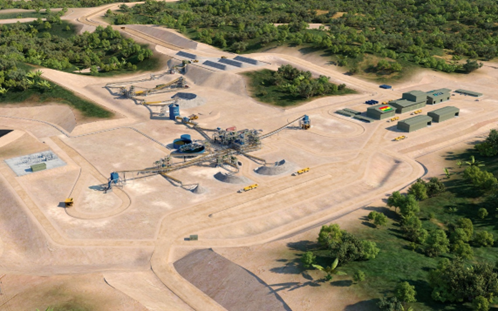Ghana could lose up to $500m in revenue if lithium refinery is built – Report – Ghana Business News
Ghana could lose as much as $500 million in revenue if country goes ahead with plans build a lithium refinery under terms outlined in its maiden lithium agreement with Barari DV, a subsidiary of Australia-based Atlantic Lithium, according to a new report by the Natural Resource Governance Institute (NRGI).
The report, based on NRGI’s economic modeling, warns that a refinery built in the next few years is unlikely to generate meaningful returns for Ghanaians. It found the facility would need to purchase Ghana’s lithium concentrate at below-market prices just to break even, a move that would shift potential government revenue into sustaining the plant’s operations.
“A refinery built in the next few years is unlikely to generate much benefit for Ghanaians,” the report stated. “NRGI modeling suggests it could cost the government at least $500 million in lost revenue.”
While the government has positioned value addition as central to its green minerals strategy, NRGI’s findings raise questions about the viability and broader economic benefits of such projects.
The report also noted that the refinery is unlikely to create more than 200 direct jobs once operational, and the potential for it to stimulate related industries remains uncertain.
In contrast, the costs – both financial and environmental – could be substantial. “The opportunity costs as well as environmental and social harms could be considerable,” NRGI said.
Ghana signed its first lithium deal with Atlantic Lithium in October 2023, granting Barari DV the right to develop the Ewoyaa Lithium Project in the Central Region. The agreement includes provisions for local processing, a move the government has hailed as a step toward industrialisation and greater domestic control of mineral value chains.
The company planned to begin producing lithium spodumene concentrate from its Ewoyaa mine within two years, pending parliamentary approval of its mining lease agreement. Half of Ewoyaa’s production is already committed for export.
However, about one and a half years after the agreement, it is yet to be ratified by Parliament, putting on hold plans contained in the agreement, which include a refinery to process the remaining lithium.
The NRGI argues that while Ghana’s ambition to advance in the lithium value chain is understandable, that access and proximity to mineral deposits play only a minor role in determining the viability and benefits of such a move.
“As it pursues its lithium refining ambitions, the government must ground its strategy in economic feasibility, market outlook and a rigorous cost-benefit analysis.”
The report noted that the country’s ambitions to refine its lithium domestically are unfolding in a challenging global context. “While many governments and companies have pursued lithium refining in recent years, few have been successful. China’s technical expertise and cost advantages mean it currently hosts all but three of the world’s refineries for converting spodumene concentrate into lithium chemicals, and two of the refineries outside China have recently canceled expansion plans.”
Furthermore, it said excess refining capacity in China, along with uncertainty about the growth of demand for and pricing of lithium chemicals in the rest of the world, is further compounding the challenging economics for refineries outside China.
Against this backdrop, it contended that a Ghanaian refinery would face additional challenges. “It would have limited access to feedstock unless more lithium discoveries are made in the country or the refinery identifies other sources.”
NRGI’s modeling shows the refinery would struggle to be profitable unless it underpays for locally mined concentrate, shifting potential state revenue into keeping the plant afloat.
“This holds whether it has access only to Ewoyaa’s current reserves or secures enough feedstock for a typical 20-year operation; sells to China or the ‘rest of the world’ (ROW); or faces low, medium or high lithium carbonate prices.”
It asserted that the lower price that the refinery would pay for Ewoyaa’s production would reduce government revenue from royalties, taxes and dividends paid by Barari.
“Even if the refinery secures enough feedstock to operate for 20 years, the government still loses more than $300 million in revenue. However, the government would struggle to attract investors in an unprofitable refinery, and providing direct financial support or building and owning the refinery itself would also negatively impact public finance.
NRGI therefore, suggests that the government adopt a mine-and-monitor approach, prioritising the timely start of the Ewoyaa mine. This involves supporting further lithium exploration, monitoring global lithium refining conditions, and developing a strategy for byproduct use to enhance future refining prospects.
Also, it called for transparency and citizen engagement in the decision-making process, noting it as essential to building trust, managing expectations, and ensuring a strong investment climate for future lithium refining.
By Nana Kwamena Botwe
The post Ghana could lose up to $500m in revenue if lithium refinery is built – Report appeared first on Ghana Business News.

